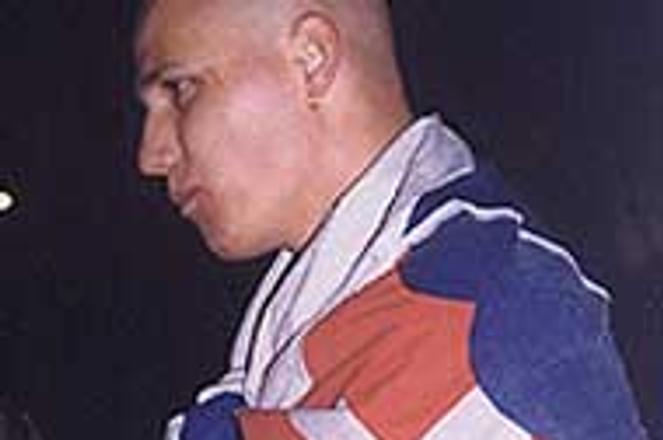Andrej, a 19 year-old skinhead, answers questions at a March 14 rally.photo: Jana Kollárová
In what has become a gruesomely regular occurence, skinheads in Bratislava claimed yet another victim on March 10 when three more members of the foreign community were beaten up by youths yelling racial threats.
The attack occurred off Michalska Street by the Prašná Bašta restaurant in the Bratislava Old Town at 20:30 on Friday, March 10. A group of around eight skinheads, one armed with a baseball bat, attacked two Brazilian and two Angolan students. One of the Angolan students managed to escape unscathed, but his three companions were kicked and beaten by the group of skinheads. After the incident, the victims were taken to the downtown Fakultná nemocnica hospital for a preventive medical check.
Moses Thompson and Chris Martin, both Americans who live in Bratislava, reported to The Slovak Spectator on March 15 that they had witnessed the Friday night attack. "It was a busy Friday night in the Old Town when we passed by a group of black students who were quickly followed by a group of young white men with shaved heads. One of the skinheads was carrying a baseball bat and struck a young black man under his eye," they wrote in a statement to the newspaper.
The skinheads ran away after they discovered that the police had been called, Thompson and Martin continued. "The police arrived 40 minutes later. Where was the police presence in the Old Town on this Friday night?"
Marta Bujňáková, the spokeswoman for the Bratislava District Police Headquarters, said that the boys had not suffered serious injuries. "The two Brazilians, 22-year-old Lincoln Alexandre De Solesa, and 21-year-old Komotti Marcus Gerard, suffered bruises on their bodies, and the Angolan student, 22-year-old Charity Alexandre Lukamin, suffered an open wound when his cheek bone was cut open probably by the baseball bat," she said.
International observers reacted to the latest attacks with the same alarm they have sounded to similar recent incidents, such as the beating of two Japanese tourists near the Bratislava castle on February 17.
"Such beatings are the most obvious breaches of human rights," said Dagmar Kusá, Human Rights Monitor Project Co-ordinator at the Slovak Helsinki Committee in Bratislava. "We know that we are not the only country with a racism problem, but we should be worried that the problem has thus far not been recognised as a problem, and that their has been no ensuing solutions offered."
Bujňáková said that the police had detained around 20 skinheads who were found in the area that night and brought them to the police station. "Of these, only one [26-year-old skinhead Martin D.] was identified by the foreign students as having taken part in the beating."
Kusá praised the police for making the immediate arrests, but said she feared that justice would not be brought against Martin D., and that this racial attack would end like others of its kind: without a court conviction.
Bujňáková said that Martin D. stood accused of committing a "violent criminal act against a person or group of persons." Martin D. has since been released from police custody as the police prosecutor investigates the case. If convicted, he could face one year in prison, but Bujňáková noted that if the attack is proven to be racially motivated, an additional year could be added to his sentence.
"A two-year punishment is too small for such a crime," responded Kusá. "Slovak legislation does not sufficiently address these kinds of crimes. What is even sadder is that official state organs, such as the police and law-makers, underestimate the problem."
The victims all study at the Institute for Language and Academic Preparation of Foreign Students (ÚJOP) in Bratislava, and declined an interview with The Slovak Spectator. The vrátnik (doorkeeper) at ÚJOP said on March 14 that all the foreign students were afraid to leave their dorm rooms for fear of falling victim to skinhead attacks on the anniversary of the establishment of the Slovak nazi-puppet state in 1939.
"The whole day most of our students have stayed in their rooms and hardly anybody has come out at all," he said. "They fear to go out because the skinheads might beat them."
When attempting to telephone the boys, the vrátnik said that Lincoln had turned his phone off and that Komotti let the phone ring unanswered. "They're both in the building, I'm sure," he said, with a shrug of his shoulders. "But as I told you, the atmosphere here has been strange the whole day. Everybody is just so quiet."


